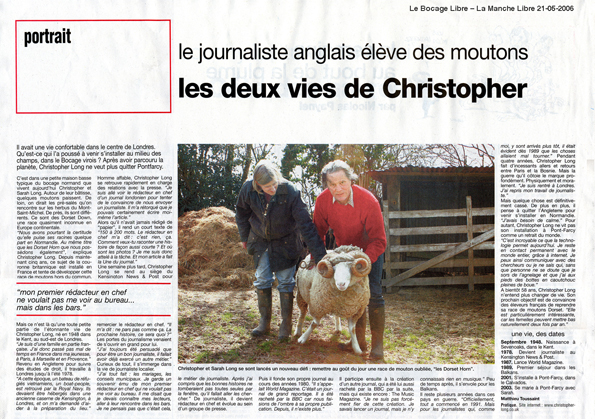Christopher's Two Lives
The English journalist raising sheep
Le Bocage Libre — La Manche Libre 21-05-2006
The following article, les deux vies de Christopher by Matthieu Toussaint, appeared in La Manche Libre. It was largely inspired by growing local interest in our Dorset Horn and Dorset Down sheep...
Original article by Matthieu Toussaint. English translation by Christopher Long.
 He once lived comfortably in the centre of London. What pushed him to settle among the fields of the Bocage Virois? Having travelled the globe, Christopher Long wants to stay in Pont-Farcy.
He once lived comfortably in the centre of London. What pushed him to settle among the fields of the Bocage Virois? Having travelled the globe, Christopher Long wants to stay in Pont-Farcy.
Today, Christopher and Sarah Long live in a small house, typical of the Norman Bocage. Around the house are grazing sheep. From a distance you might take them for the pré-salés one sees on grassland around Mont-Saint-Michel. From close up, they're different. They're Dorset Downs, a breed almost unknown in continental Europe.
"Nevertheless, we're sure they have roots of some sort in Normandy, just like the Dorset Horns we also have here," explains Christopher Long. For five years this 'subject of the British crown' has been settled in France trying to establish this unusual breed of sheep.
But this is only a small part of the surprising life of Christopher Long, born in 1948 in Kent, south-east of London.
"I come from a family that is partly French. So when I was young I spent a lot of time in Paris, Marseille and Provence."
Returning to England to study law, he then worked in London until summer 1978.
"It was then that a boat full of Vietnamese refugees, boat-people, was found by the Royal Navy. They had to be housed in an old barracks in Kensington, London, and I was asked to help get the place prepared for them."
A good-natured man, Christopher Long quickly found himself in charge of press relations. "I went to see the editor of the local newspaper to try and persuade him to send a reporter. His reply was that I could surely write the article myself."
So, although he had never written for a paper before he wrote a brief story of about 150-200 words. "But this is nothing at all, the editor protested. How can you tell a story like this in so few words? And where are the pictures? And so I found myself harnessed and my article eventually made the lead story of the paper."
A week later Christopher Long went to the offices of the Kensington News & Post to thank the editor. "You can't just leave like that, he said. Your next story: what's it going to be?" The doorway to journalism stood wide open before him.
"I've always thought that, to be a good journalist, you need to have had another career beforehand." Curious about everything he found himself plunged into local journalism.
"I did it all: the marriages and the council meetings. I still have the warmest memories of my first editor who never wanted to see me in the office. He used to tell me to get to know the readers, to go out and meet them in cafés. I hadn't realised this was what journalism was about. Then I learned that good stories don't fly in through the window: that you have to go out and look for them." From being a journalist he became an editor for a newspaper group.
Then he founded his own publication in the 1980s. "It was called World Magazine – a major international magazine. It was later bought by the BBC because it was over-shadowing their own publications. After that it was killed."
He then created another magazine which, in the end, was also bought by the BBC but which still exists: The Music Magazine. "I'm not really very proud of this creation. I knew how to launch publications but I knew absolutely nothing about music." Soon after he took off for the Balkans.
He spent several years in these war-torn countries. "Officially it all started in 1991. But, for journalists like me, who arrived there very early on, it was clear from 1989 that disaster was looming."
For four years [in fact 1989-1999] Christopher Long made incessant trips from Paris to Bosnia. But the war he was following affected him deeply. Physically and psychologically. "I returned to London and went back into journalism there."
But something had snapped. More and more he thought of leaving England to settle in Normandy. "I needed peace." But that said, Christopher Long's life in Pont-Farcy is not a retreat from the world.
"It's extraordinary what technology offers us today. I'm in constant contact with the whole world thanks to the internet. So I'm in touch with academics and all sorts of colleagues without any of them knowing that I've just been lambing and am still wearing wellington boots covered in mud."
Approaching 58 years old, Christopher Long has no plans to change his life. His next objective is to convince French sheep breeders to accept his breeds of Dorset sheep. "They [Dorset Horns] are particularly interesting because the females can produce lambs quite naturally twice a year."
Life and dates
September 1948. Born in Sevenoaks, Kent.
1978. Becomes a journalist with The Kensington News & Post.
1987. Launches World Magazine.
1989. First tour in The Balkans
2001. Settles in Pont-Farcy, Calvados.
2003. Marries Sarah at Pont-Farcy.
Matthieu Toussaint
Practical: Web site: www.christopherlong.co.uk
© (2006) Christopher Long. Copyright, Syndication & All Rights Reserved Worldwide.
The text and graphical content of this and linked documents are the copyright of their author and or creator and site designer, Christopher Long, unless otherwise stated. No publication, reproduction or exploitation of this material may be made in any form prior to clear written agreement of terms with the author or his agents.
















